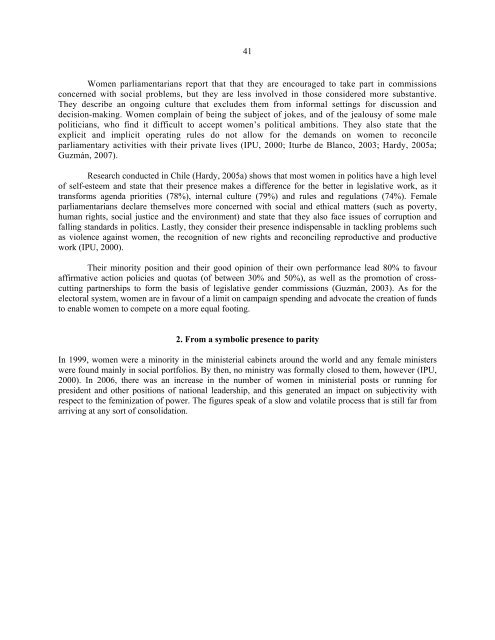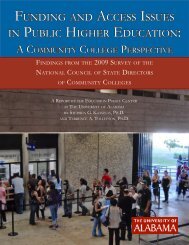Women in Latin America and the Caribbean - Cepal
Women in Latin America and the Caribbean - Cepal
Women in Latin America and the Caribbean - Cepal
You also want an ePaper? Increase the reach of your titles
YUMPU automatically turns print PDFs into web optimized ePapers that Google loves.
41<br />
<strong>Women</strong> parliamentarians report that that <strong>the</strong>y are encouraged to take part <strong>in</strong> commissions<br />
concerned with social problems, but <strong>the</strong>y are less <strong>in</strong>volved <strong>in</strong> those considered more substantive.<br />
They describe an ongo<strong>in</strong>g culture that excludes <strong>the</strong>m from <strong>in</strong>formal sett<strong>in</strong>gs for discussion <strong>and</strong><br />
decision-mak<strong>in</strong>g. <strong>Women</strong> compla<strong>in</strong> of be<strong>in</strong>g <strong>the</strong> subject of jokes, <strong>and</strong> of <strong>the</strong> jealousy of some male<br />
politicians, who f<strong>in</strong>d it difficult to accept women’s political ambitions. They also state that <strong>the</strong><br />
explicit <strong>and</strong> implicit operat<strong>in</strong>g rules do not allow for <strong>the</strong> dem<strong>and</strong>s on women to reconcile<br />
parliamentary activities with <strong>the</strong>ir private lives (IPU, 2000; Iturbe de Blanco, 2003; Hardy, 2005a;<br />
Guzmán, 2007).<br />
Research conducted <strong>in</strong> Chile (Hardy, 2005a) shows that most women <strong>in</strong> politics have a high level<br />
of self-esteem <strong>and</strong> state that <strong>the</strong>ir presence makes a difference for <strong>the</strong> better <strong>in</strong> legislative work, as it<br />
transforms agenda priorities (78%), <strong>in</strong>ternal culture (79%) <strong>and</strong> rules <strong>and</strong> regulations (74%). Female<br />
parliamentarians declare <strong>the</strong>mselves more concerned with social <strong>and</strong> ethical matters (such as poverty,<br />
human rights, social justice <strong>and</strong> <strong>the</strong> environment) <strong>and</strong> state that <strong>the</strong>y also face issues of corruption <strong>and</strong><br />
fall<strong>in</strong>g st<strong>and</strong>ards <strong>in</strong> politics. Lastly, <strong>the</strong>y consider <strong>the</strong>ir presence <strong>in</strong>dispensable <strong>in</strong> tackl<strong>in</strong>g problems such<br />
as violence aga<strong>in</strong>st women, <strong>the</strong> recognition of new rights <strong>and</strong> reconcil<strong>in</strong>g reproductive <strong>and</strong> productive<br />
work (IPU, 2000).<br />
Their m<strong>in</strong>ority position <strong>and</strong> <strong>the</strong>ir good op<strong>in</strong>ion of <strong>the</strong>ir own performance lead 80% to favour<br />
affirmative action policies <strong>and</strong> quotas (of between 30% <strong>and</strong> 50%), as well as <strong>the</strong> promotion of crosscutt<strong>in</strong>g<br />
partnerships to form <strong>the</strong> basis of legislative gender commissions (Guzmán, 2003). As for <strong>the</strong><br />
electoral system, women are <strong>in</strong> favour of a limit on campaign spend<strong>in</strong>g <strong>and</strong> advocate <strong>the</strong> creation of funds<br />
to enable women to compete on a more equal foot<strong>in</strong>g.<br />
2. From a symbolic presence to parity<br />
In 1999, women were a m<strong>in</strong>ority <strong>in</strong> <strong>the</strong> m<strong>in</strong>isterial cab<strong>in</strong>ets around <strong>the</strong> world <strong>and</strong> any female m<strong>in</strong>isters<br />
were found ma<strong>in</strong>ly <strong>in</strong> social portfolios. By <strong>the</strong>n, no m<strong>in</strong>istry was formally closed to <strong>the</strong>m, however (IPU,<br />
2000). In 2006, <strong>the</strong>re was an <strong>in</strong>crease <strong>in</strong> <strong>the</strong> number of women <strong>in</strong> m<strong>in</strong>isterial posts or runn<strong>in</strong>g for<br />
president <strong>and</strong> o<strong>the</strong>r positions of national leadership, <strong>and</strong> this generated an impact on subjectivity with<br />
respect to <strong>the</strong> fem<strong>in</strong>ization of power. The figures speak of a slow <strong>and</strong> volatile process that is still far from<br />
arriv<strong>in</strong>g at any sort of consolidation.











